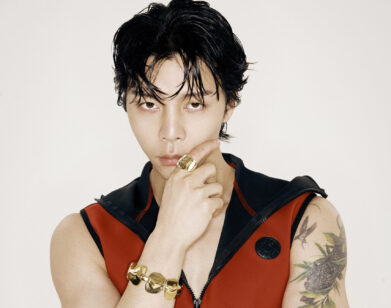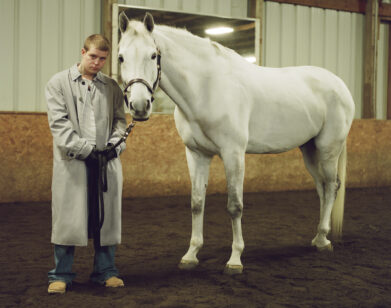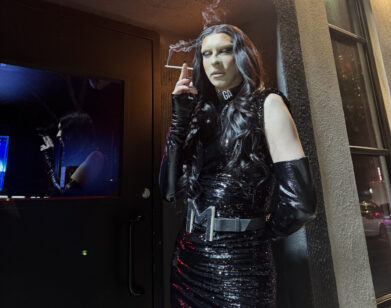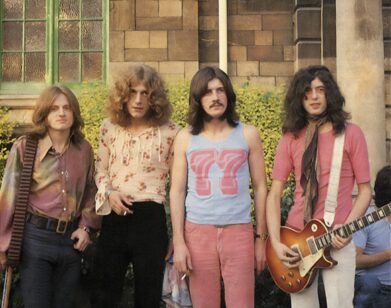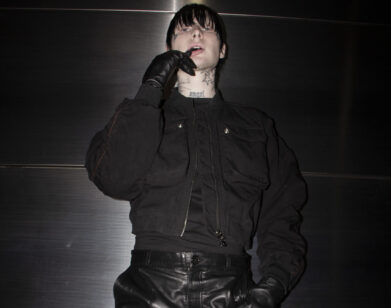Foxygen
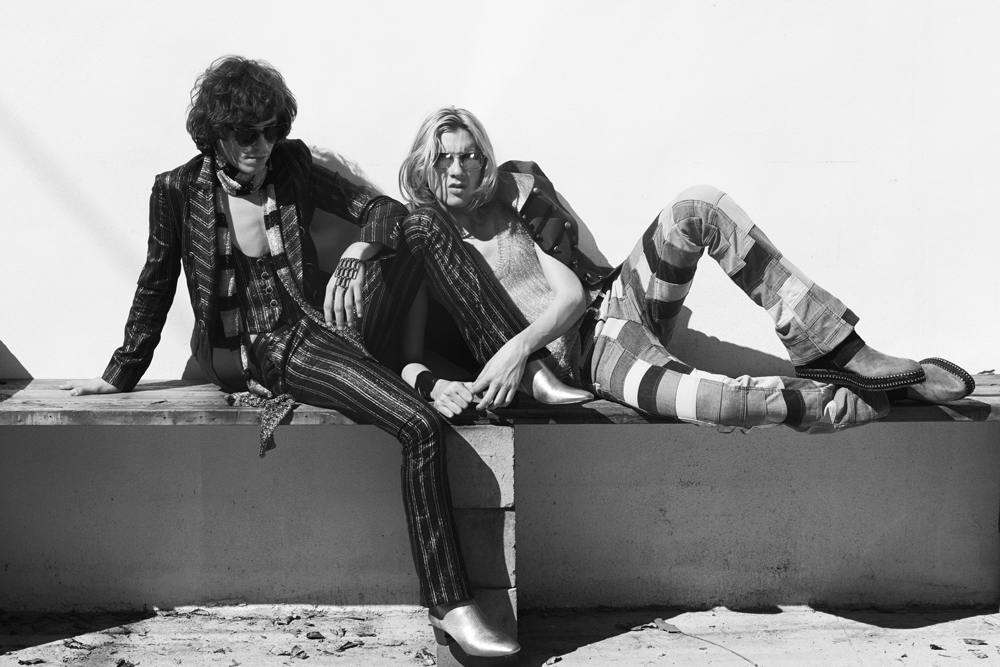
JONATHAN RADO AND SAM FRANCE OF FOXYGEN IN NEW YORK, OCTOBER 2014. STYLING: ANDREAS KOKKINO. ON RADO: ALL CLOTHING, SCARF, AND SHOES: TOMMY HILFIGER COLLECTION. SUNGLASSES: RADO’s OWN. JEWELRY: LIZZ JARDIM. ON FRANCE: JACKET, TANK, AND JEANS: TOMMY HILFIGER COLLECTION. SUNGLASSES: FRANCE’S OWN. BELT: SAINT LAURENT BY HEDI SLIMANE. SHOES: ROBERTO CAVALLI. HAIR: DENNIS LANNI FOR ART DEPARTMENT/HAIR STORY INC. MAKEUP: ALICE LANE/JED ROOT.
The expected life cycle of a successful rock band follows a familiar narrative arc that moves from light to dark and then (one hopes) back to light again. The story goes something along the lines of the flush of runaway success followed by a period of tremendous excess, which then leads to a problematic sophomore album, strained relationships, romantic breakups, humbling make-ups, and—eventually—either a return to form or total burnout. It’s what we’ve come to know as the classic VH1 Behind the Music time line that seems as old as rock music itself. The entire process could take a few years to cycle through. In the case of Los Angeles’s Foxygen, it seemed to play out in the course of a few months.
When Foxygen released their second album, 2013’s critically lauded We Are the 21st Century Ambassadors of Peace & Magic, fans and critics embraced the duo’s sound as a kind of whip-smart throwback to ’70s FM radio and sunny California rock of yore. However, the sanguine vibe stood in stark contrast to the band’s mess-tacular live shows, which evidenced a group teetering on the edge. Frontman Sam France and guitarist Jonathan Rado—the duo at the core of Foxygen—often seemed not only at odds with each other, but with the audience as well. By the time the band completed a seemingly endless tour in support of 21st Century Ambassadors, the increasingly tense dynamic—resulting in onstage meltdowns, cancelled appearances, and volatile live shows (one, in Minneapolis, ended with France falling off the stage and breaking his leg)—suggested that perhaps everyone involved in Foxygen would rather part ways than make another record. Just a little over a year after the release of their debut, 2012’s Take the Kids Off Broadway, it looked like they were done.
Luckily, this was where longtime friends France, 25, and Rado, 24, opted to take back the wheel on a career that had started to feel like it was careening towards a cliff. The two decamped to Rado’s home studio in his garage—which they dubbed Dream Star Studio—and reimagined themselves as a don’t-give-a-fuck punk band called Star Power. It was a trick that ultimately saved both Foxygen and their friendship, clearing the path for the duo to shed their buzz-band baggage and create their most psychedelically expansive offering to date, a gloriously freaky 24-track double album called …And Star Power. The record is both beautiful and maddening, a kaleidoscope of psych rock, spooky folk, and scuzzy garage jams that seems to reflect the accelerated, turbulent experience of their previous two years. In trying to describe in their liner notes what will surely be one of the year’s most beloved—and perhaps divisive—releases, Foxygen call …And Star Power “a cinematic, auditory adventure for the speedy freaks, skull krunchers, abductees, and misfits … the radio station you can hear only if you believe.”
T. COLE RACHEL: The most exciting thing about your new record is the fact that it actually exists. Was there ever a point when you seriously thought that you’d never make another record together?
JONATHAN RADO: Not really. I think we both knew that it needed to happen and that it was gonna happen at some point. Mostly, it just felt like we were never gonna have the time to make another record. Basically, the minute we were finally done touring the last record, we got started making this one. It was never a question.
RACHEL: The two of you have been making music together for most of your lives. How long have you actually known each other?
RADO: For 10 years?
SAM FRANCE: Since the sixth grade.
RACHEL: 2013 was, by all accounts, a very tumultuous year for you guys. Looking back, was it just the rapid success—and the huge amount of attention—that made things so bewildering?
RADO: Was it bewildering?
FRANCE: Everything just happened so quickly. There was no time to actually be bewildered by it. We had so many commitments—tours, videos, photo shoots, whatever—that there was never any time to process any of it. We were also so bratty. We just never thought too much about what was going on. We didn’t realize that we were so popular. We didn’t understand it. In a way, we are still surprised by that. When people tell me that they’re excited to hear the new album, I’m always like, “Really?”
RACHEL: One of the hardest things to learn as a new band is the importance of saying no. There is this impulse to say yes to every opportunity that comes your way out of fear of missing out on something. But that’s how people burn out.
RADO: That definitely happened to us a few times over the past year. We were pushed into doing things that we really didn’t want to do. Ultimately, I think we were able to shrug things off after it was all said and done, but it was crazy at the time.
RACHEL: Has your way of working together—the way you approach writing and recording songs—changed over the years?
FRANCE: It’s changed, but in a way it’s very much the same. Rado and I have this process that we don’t really have to think about at this point …
RADO: The way we record things is almost the same as it always was. The way we write is a little different, since we’re actually writing songs now. Before, we just kind of played these extended jams—three chords over and over—until it eventually turned into something. Come to think of it, that’s actually how we approached some of the stuff on this record, so maybe …
FRANCE: So maybe nothing has changed at all. [laughs]
RACHEL: Where was the bulk of this record made?
FRANCE: Mostly at Rado’s house in the Valley.
RADO: I converted my garage into a studio. A semi-functional studio. Mostly functional.
RACHEL: The process of making a record can be so mysterious. There is usually a point when the record slowly starts to come into focus and you can get a handle on what it is going to be. With a record as sprawling and all-over-the-place as …And Star Power, did it take a while to figure it out?
FRANCE: It was fun right off the bat to just be in a studio again. A few songs in—maybe with the song “Flowers”—we started to feel like it was working and it was good.
RACHEL: The record seems to be a much more accurate reflection of what your live show is like, which I think was something that surprised people who came out to see you play in support of your last album. They were expecting this mellow experience, and then the shows would be so crazy.
RADO: Yeah, that was definitely something we kept in mind with this record. We wanted it to be a little bit more of an accurate representation. The shows now accurately represent the new album.
FRANCE: Easy-listening punk. That’s the vibe this time.
RACHEL: You operated under the fictional moniker Star Power—a kind of punk-rock nom de plume—while working on these songs. How was that important?
FRANCE: I’m not sure exactly how it started, but at some point there was this concept that we were operating as this different band—some sort of weird punk band from space. It’s like Ziggy Stardust, you know? It’s one of those rock ‘n’ roll archetypes that we wanted to try out, operating as a kind of alter ego.
RACHEL: Did that take away some of the pressure?
FRANCE: I think so. We could just blame it on Star Power. It wasn’t us; it was Star Power.
RACHEL: You guys have always played around with rock ‘n’ roll archetypes. The first record was also very much about that—playing around with established forms. You channel everything from soul music to garage rock to ’60s-style California pop.
RADO: Yeah. I don’t know how conscious it is at this point, to be honest. We just have these ideas and then realize much later on that we are kind of doing that.
RACHEL: This record reminds me a lot of the Olivia Tremor Control, that insane Louisiana psych-pop band from the ’90s. It’s as if there were a million totally absurd ideas poured through some kind of syphon, and this is the music that came out as a result.
RADO: Olivia Tremor Control’s [Music From the Unrealized Film Script:] Dusk at Cubist Castle is great—and similar to …And Star Power in a lot of ways. You create this kind of framework that allows for all these different kinds of ideas to make sense together. It’s a crazy record.
RACHEL: Are you touring as much this time around?
RADO: Yeah, we’ll tour a lot—and probably try to visit some countries we’ve never been to before—but we also want to start recording the next record soon. We’ve already been writing for it.
RACHEL: Will it be a radical departure from this one?
RADO: We’re gonna try to work with an orchestra and record it in a famous, old L.A. studio. It would be more accessible, like a Disney-ish orchestral album.
FRANCE: Like, if Jeff Lynne from Electric Light Orchestra were to compose a Disney album.
RADO: We have a wish list of people we’d like to work with on the next album. Jeff Lynne is one of them.
FRANCE: You hear so many stories about him—like how he re-records old ELO songs in order to perfect them.
RACHEL: Who else is on your wish list?
RADO: Randy Newman, Van Dyke Parks … and maybe some of the classic L.A. session musicians, like guitarist Waddy Wachtel.
RACHEL: What is it about working together that still appeals to you?
RADO: Having known each other and worked together for so long, the process between us is kind of effortless. We’ve both played in other bands and recorded things outside of Foxygen, but there’s something about what happens between our personalities when we make music that works. Also, with it being just the two of us, we don’t have the problems that other bands do. We don’t have a bass player saying, “What about my parts?” We play all the instruments between us, and we don’t really have much ego about that stuff. Sometimes I play drums, sometimes he does … Whatever feels right in the moment.
RACHEL: …And Star Power is a pretty crazy record. Do you have a sense yet of how people are reacting to it? Do you worry about that?
RADO: It’s polarizing.
FRANCE: I’m surprised by how many people like it. Like, my friends and my family all really seem to like it. I don’t really know how the music world will ultimately react to it, but we kind of made this record with the feeling that if people like it, that’s cool. If people hate it, that’s cool, too.
RADO: I’ve read a few glowing reviews and a few really scathing ones. To be honest, both are good to me. In some ways, they are both right. It is a ridiculous album. We know. A few people have taken a really serious stance on it, like, “Why did you do this to me! What have you done with my favorite band?”
RACHEL: That can trip up a lot of bands. Do you do the thing that people loved before, or do you do something totally different?
RADO: Totally. Again, it’s like Fleetwood Mac making Tusk. We’ve always loved those kinds of albums.
FRANCE: We certainly weren’t going to try to spend time analyzing what made the first album good so that we could try to reproduce it in some way. We went in the opposite direction. We decided that we were gonna do whatever sounded cool, where we could explore every stupid, drugged-out idea we might have and just have fun with it. We knew it was gonna be kind of a mess … and we’re really happy with it.
T. COLE RACHEL IS AN INTERVIEW CONTRIBUTING EDITOR AND A WRITER BASED IN BROOKLYN. GROOMING PRODUCTS: TOM FORD FOR MEN GROOMING COLLECTION, INCLUDING OIL-FREE DAILY MOISTURIZER, CONCEALER IN LIGHT, AND HYDRATING LIP BALM; PURELY PERFECT, INCLUDING FOUNDATION CRÉME, CLEANSING CRÉME, AND SMOOTH FINISH.

